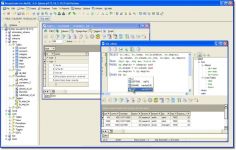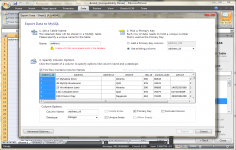 MySQL 5.5.36
MySQL 5.5.36
MySQL AB - (Open Source)
MySQL is a successful open source database used in most web applications, e-commerce and online transaction processing.
MySQL is one of the world's most famous and used open source database. The software can be used to manage web applications, e-commerce and online transaction processing since MySQL database incorporates support those transactions. It is also commonly associated with PHP when it comes to managing websites.
With standard JDBC , ODBC, and Net, the developer can choose the programming language. MySQL has the advantage of working with almost all the popular operating systems and communicate easily with programming languages ​​such as C, C + +, VB, C #, PHP, Python, Ruby, Java, Perl, Eiffel, etc.MySQL replication allows you to create profitable applications. In addition, it enables the development of typologies replication complex and massive chain.Its reliability and robustness, performance, ease of use makes MySQL have more success than anticipated.
- Title:
- MySQL 5.5.36
- File Size:
- 33.7 MB
- Requirements:
- Windows 9x / 2000 / XP / Vista / Windows7 / Windows8
- Language:
- en-us
- License:
- Open Source
- Date Added:
- 02 Feb 2014
- Publisher:
- MySQL AB
- Homepage:
- http://www.mysql.com
- MD5 Checksum:
- D21F43D85B18A077E2EC0D1C7A7A7673
# Functionality Added or Changed
* CMake now supports a -DTMPDIR=dir_name option to specify the default tmpdir value. If unspecified, the value defaults to P_tmpdir in <stdio.h>. Thanks to Honza Horak for the patch.
# Bugs Fixed
* InnoDB: Table renaming errors would appear in the LATEST FOREIGN KEY ERROR section of the SHOW ENGINE INNODB STATUS output.
* Partitioning: Queries using the index_merge optimization (see Index Merge Optimization) could return invalid results when run against tables that were partitioned by HASH.
* Partitioning: When no partition had returned a row since the last HA_ERR_KEY_NOT_FOUND error, the use of uninitialized memory in the priority queue used for returning rows in sorted order could lead to a crash of the server.
* Replication: mysqlbinlog --verbose failed when it encountered a corrupt row event in the binary log. Such a row event could also cause the slave to fail.
* Replication: When log_warnings is greater than 1, the master prints binary log dump thread information—containing the slave server ID, binary log file name, and binary log position—in mysqld.1.err. A slave server ID greater than 2 billion was printed with a negative value in such cases.
* Replication: Invalid event offsets in the binary log were not always handled correctly, which could lead to replication failure.
* The cache used for the Index Merge access method was freed only after successful retrieval of all rows. Interruption or failure of the operation led to a file descriptor leak.
* For utf8 and utf8mb4 strings, handler functions unnecessarily called a Unicode conversion function.
* Use of a nonmulti-byte algorithm for skipping leading spaces in multi-byte strings could cause a server exit.
* For the utf8_bin collation, ORDER BY LOWER(col_name) could produce incorrect ordering.
* On Windows, the --local-service server option did not work, and was not displayed in the --help message.
* The prototype of the Performance Schema instrumentation API mysql_cond_timedwait() call was fixed to be drop-in compatible with pthread_cond_timedwait(). This fix affects only implementers of third-party plugins.
* For the path specified with the --basedir option, mysql_plugin attempted to unlink the path rather than free the memory in which the path was stored.
* COUNT(DISTINCT) sometimes produced an incorrect result when the last read row contained a NULL value.
* Some scripts displayed out-of-date information regarding where to report bugs.
* Updating a FEDERATED table with UPDATE... JOIN caused a server exit when the local table contained a single row and that row could be joined to a row in the FEDERATED table.
* mysql_install_db referred to the obsolete mysqlbug script for reporting problems.
Related software
2.1/5 from 178 users


